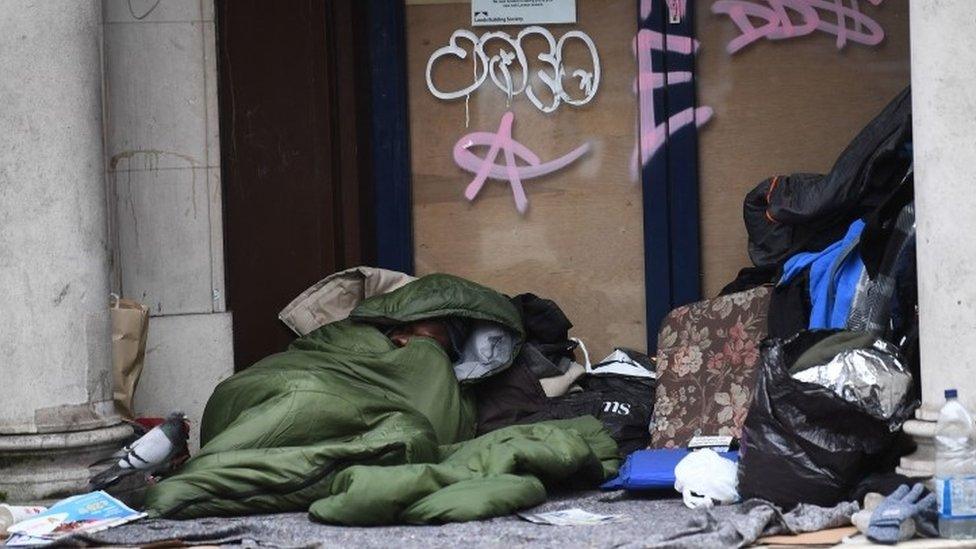Coronavirus: 'Safe spaces' needed for homeless to self-isolate
- Published

Safe spaces must be provided for the homeless and other vulnerable people to self-isolate, ministers are being told.
Lib Dem MP Layla Moran is calling for empty offices to be requisitioned to ensure the homeless are treated with dignity as the coronavirus spreads.
Proposed new laws, reportedly giving the police the power to arrest anyone with the virus not self-isolating indoors, will be published this week.
She warned rough sleepers could be "disproportionately affected" by this.
Details of emergency legislation giving the authorities extra powers to deal with the outbreak are due to be published on Thursday.
It has been reported that the plans could give the police the power to detain anyone who has tested positive for coronavirus or even showing symptoms and who is yet still circulating in public.
The government's current advice is that anyone with a fever or a new continuous cough must remain at home for at least a week.
Further measures, including requiring every Briton over the age of 70 to stay at home for an extended period to "shield" them from the virus, are expected in the coming weeks.
Health Secretary Matt Hancock has said the emergency legislation, which is expected to be fast-tracked through Parliament later this month, will "prepare" the country for the expected spike in cases over the coming months.
Speaking on Sunday, he would not be drawn on specific details but said he hoped some of the measures would not actually be needed because people would behave "responsibly".
'Last resort'
Opposition parties say they support the government in its efforts to fight the virus but have expressed concerns about the scope of some of the powers being touted - which could remain in place for months.
Ms Moran said there had been a welcome fall in recent years in arrests of homeless people and the power of arrest should only be used as a "last resort".
"I support all evidence-led action to prevent the spread of Covid-19," she said. "Yet I worry that these new detention powers will disproportionately affect the most vulnerable in our society, including the homeless.
"The idea of police arresting homeless people, many with complex health and addiction issues, without proper testing, and placing them in detention centres just doesn't sit right."

EASY STEPS: How to keep safe
A SIMPLE GUIDE: What are the symptoms?
GETTING READY: What is the UK's 'delay' phase?
TRAVEL PLANS: What are your rights?

She said the government must provide "compassionate" accommodation which encouraged homeless people who might be showing symptoms associated with the virus to come forward.
"The government should seek to care for homeless people and set up special services for them in disused buildings or vacated offices in cities," she added.
"These facilities should provide a sanitised place to eat, drink water and use the toilet. And, they should provide safe spaces for vulnerable people to self-isolate with dignity, as opposed to within a detention facility following arrest."
Hotel rooms
Campaign groups have urged the government to block book empty hotel rooms to allow the homeless to self-isolate, saying the bills could be covered by the £500m hardship fund announced in Chancellor Rishi Sunak's Budget.
The Museum of Homelessness and Streets Kitchen said this would keep people safe, minimise the risk of cross-infection and allow better health monitoring.
It said its plan would "reduce hospital admissions, stop people being turfed out of hospital shelters onto the street and concentrate community efforts", adding that everyone should be given a roof over their head "regardless of the immigration status or situation".
Labour leader Jeremy Corbyn has asked for "urgent sight" of the draft laws and for a meeting with the prime minister to discuss the crisis.
Lisa Nandy, one of three candidates seeking to succeed Mr Corbyn, said she believed the public would support immediate action to safeguard people's health but she had reservations about some of the plans being touted.
"I'm really quite concerned about the idea we are giving sweeping powers to the police and immigration officers in order to detain people who are sick while we don't seem to have a real plan to deal with our elder people," she told the BBC Andrew Marr show.